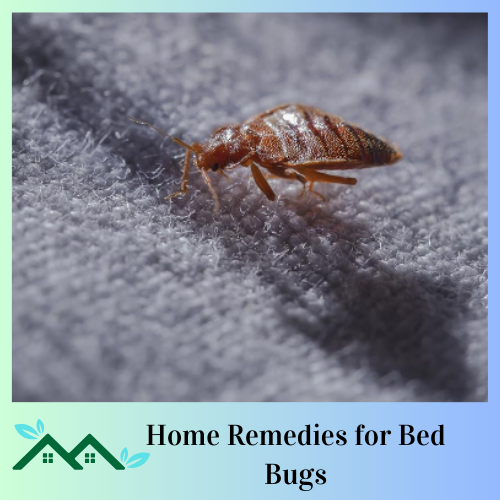Hello Friends , welcome to my blog. Today we will discuss about Home Remedies for Bed Bugs. Bed bugs are tiny insects that feed on the blood of humans and animals. They are nocturnal pests that thrive in warm environments, making our homes their ideal habitats. Despite their small size, bed bugs can cause significant discomfort and distress. In this article, we’ll explore effective home remedies to tackle bed bug infestations and reclaim your space.
Home Remedies for Bed Bugs: You should know

Identification of Bed Bugs
Before delving into remedies, it’s crucial to identify a bed bug infestation. These pests are small, reddish-brown insects that hide in cracks, crevices, and mattress seams during the day and emerge at night to feed. Signs of infestation include tiny blood stains on bedding, dark spots (excrement), and shed skins. Understanding the lifecycle of bed bugs aids in devising effective treatment strategies. (Home Remedies for Bed Bugs: You should know)
Health Risks Associated with Bed Bugs
Prevention Tips
Prevention is key to avoiding bed bug infestations. Maintaining a clean environment by regularly vacuuming and decluttering reduces hiding spots for bed bugs. Washing bedding and clothes in hot water and sealing cracks and crevices prevent their entry into your home.
Natural Remedies for Bed Bugs
Several natural remedies effectively repel and eliminate bed bugs. Essential oils such as lavender, tea tree, and peppermint disrupt their nervous system and deter them from settling. Diatomaceous earth, a fine powder, dehydrates and kills bed bugs upon contact. Heat treatment is another eco-friendly option, as bed bugs perish at temperatures above 120°F (49°C). (Home Remedies for Bed Bugs: You should know)
Home Remedies
In addition to natural remedies, common household items can combat bed bugs. Vinegar, when sprayed directly on bed bugs, disrupts their scent trails and kills them. Baking soda, mixed with water to form a paste, can be applied to bites to alleviate itching. Steam cleaning furniture, carpets, and upholstery effectively eliminates bed bugs and their eggs. (Home Remedies for Bed Bugs: You should know)
Decluttering and Vacuuming
Decluttering is essential for reducing hiding spots and facilitating treatment effectiveness. Vacuuming regularly, paying close attention to seams, cracks, and crevices, removes bed bugs and their eggs. Proper disposal of vacuum bags outside the home prevents re-infestation. (Home Remedies for Bed Bugs: You should know)
Professional Assistance
In severe infestations, seeking professional help is advisable. Exterminators employ various methods like chemical treatments, heat, and steam to eradicate bed bugs. It’s crucial to follow their instructions for preparation and post-treatment precautions to ensure effectiveness.
Monitoring and Maintenance
After treatment, regular monitoring is essential to catch any resurgence early. Implementing preventive measures like mattress encasements and interceptors prevents bed bugs from returning. Prompt action upon detecting signs of re-infestation ensures long-term relief.
Conclusion
Dealing with bed bugs can be challenging, but with a combination of natural remedies, home treatments, and professional assistance, you can reclaim your home and peace of mind. By understanding their habits and employing preventive measures, you can keep your living space bed bug-free. (Home Remedies for Bed Bugs: You should know)
FAQs (Frequently Asked Questions)
How do I know if I have bed bugs?
Look for signs like blood stains on bedding, dark spots, and shed skins.
Can I get rid of bed bugs on my own?
While it’s possible, severe infestations may require professional intervention.
Do essential oils really work against bed bugs?
Yes, certain essential oils disrupt bed bugs’ nervous system and act as natural repellents.
How long does it take to get rid of bed bugs completely?
The timeline varies based on the severity of the infestation and chosen treatment methods.
Are bed bugs a sign of poor hygiene?
No, bed bugs can infest even clean homes through travel or second-hand furniture.
Can bed bugs transmit diseases?
While bed bugs are not known to transmit diseases directly, their bites can cause allergic reactions and secondary skin infections. However, they are not vectors for diseases like mosquitoes or ticks.
Can bed bugs live in electronics or appliances?
Yes, bed bugs can hide in electronics and appliances, especially if they provide warm hiding spots. It’s essential to inspect and treat these items thoroughly during bed bug infestations.
Do bed bugs only infest beds?
Despite their name, bed bugs can infest various areas in the home, including furniture, carpets, baseboards, and even behind wallpaper. They are attracted to warmth and carbon dioxide, not just beds.
Are there any DIY traps for catching bed bugs?
Yes, DIY traps like sticky tape traps and homemade interceptors can help monitor and catch bed bugs. While they may not eliminate an infestation entirely, they provide valuable insight into the extent of the problem. (Home Remedies for Bed Bugs: You should know)
What should I do if I find a bed bug in a hotel room?
If you encounter bed bugs in a hotel room, notify the management immediately and request a change of rooms. Avoid placing luggage or personal belongings on the bed or furniture, and inspect your belongings before leaving to prevent bringing bed bugs home with you.